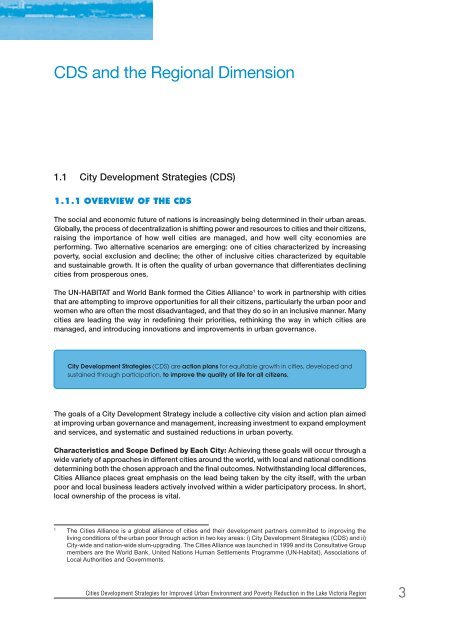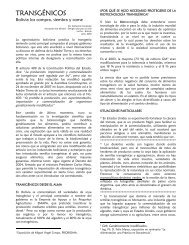CDS and the Regional Dimension1.1 City Development Strategies (CDS)1.1.1 OVERVIEW OF THE CDSThe social and economic future of nations is increasingly being determined in their urban areas.Globally, the process of decentralization is shifting power and resources to cities and their citizens,raising the importance of how well cities are managed, and how well city economies areperforming. Two alternative scenarios are emerging: one of cities characterized by increasingpoverty, social exclusion and decline; the other of inclusive cities characterized by equitableand sustainable growth. It is often the quality of urban governance that differentiates decliningcities from prosperous ones.The <strong>UN</strong>-HABITAT and World Bank formed the Cities Alliance 1 to work in partnership with citiesthat are attempting to improve opportunities for all their citizens, particularly the urban poor andwomen who are often the most disadvantaged, and that they do so in an inclusive manner. Manycities are leading the way in redefining their priorities, rethinking the way in which cities aremanaged, and introducing innovations and improvements in urban governance.City Development Strategies (CDS) are action plans for equitable growth in cities, developed andsustained through participation, to improve the quality of life for all citizens.The goals of a City Development Strategy include a collective city vision and action plan aimedat improving urban governance and management, increasing investment to expand employmentand services, and systematic and sustained reductions in urban poverty.Characteristics and Scope Defined by Each City: Achieving these goals will occur through awide variety of approaches in different cities around the world, with local and national conditionsdetermining both the chosen approach and the final outcomes. Notwithstanding local differences,Cities Alliance places great emphasis on the lead being taken by the city itself, with the urbanpoor and local business leaders actively involved within a wider participatory process. In short,local ownership of the process is vital.1The Cities Alliance is a global alliance of cities and their development partners committed to improving theliving conditions of the urban poor through action in two key areas: i) City Development Strategies (CDS) and ii)City-wide and nation-wide slum-upgrading. The Cities Alliance was launched in 1999 and its Consultative Groupmembers are the World Bank, United Nations Human Settlements Programme (<strong>UN</strong>-<strong>Habitat</strong>), Associations ofLocal Authorities and Governments.Cities Development Strategies for Improved Urban Environment and Poverty Reduction in the Lake <strong>Victoria</strong> Region3
The CDS has so far been applied in many countries in Asia, Africa, Europe and Latin America. Atthe end of 2000, 42 cities in six regions were involved in the CDS activity 2 : six in Africa, 18 in EastAsia, 1 in Eastern Europe, five in Latin America, nine in South Asia and three in the Middle East.The Urban Management Programme has completed the participatory development of CDS inseven cities. 3 These cities are Bamako (Mali), Cunca (Ecuador), Colombo (Sri Lanka),Johannesburg (South Africa), Santo Andre (Brazil), Shenyang (China), and Tunis (Tunisia). Thesenumbers have gone up considerably with new initiatives coming up and with lessons andexperiences gained from past initiatives.The Lake <strong>Victoria</strong> CDS initiative in the three cities is a new initiative, which is adding a newdimension to the whole approach – the application of CDS to regional spatial and environmentalplanning.1.1.2 APPLICATION TO REGIONAL SPATIAL PLANNINGThe CDS process, which lays much emphasis on participation and shared city vision, has beenfound to be applicable to regional planning. Cities of the same region which share uniquecommonalities within the context of their natural, socio-cultural, development circumstances orhistory, may find it mutually beneficial to form a shared vision for development of their entireregion. The Lake <strong>Victoria</strong> CDS for Improved Urban Environment and Poverty Reduction is anattempt to apply the CDS to regional spatial planning.1.2 Project Background1.2.1 OBJECTIVESThe Lake <strong>Victoria</strong> CDS/Slum Up-grading for Improved Urban Environment and Poverty Reductionaims to mobilize city authorities in the Lake <strong>Victoria</strong> region, and other stakeholders to develop aprogramme for laying out City Development Strategies. These strategies uphold popular, privateand public participation and decision-making in efforts to improve the living conditions andenvironment for urban dwellers. This project is an effort to address the absence of effectiveplanning in cities and to complement the Master Planning approach, which is mainly physical innature and often non-inclusive.This initiative informs the sub-regions and participating cities on participatory approaches forpreparation of the CDS/Slum upgrading programme. It builds on the ongoing MunicipalDevelopment Programme (MDP) activities in Kampala, the Sustainable Cities Programme (SCP– a joint programme of <strong>UN</strong>-HABITAT and <strong>UN</strong>EP) activities in Tanzania, and UMP activities in theentire region. Collaboration with the Lake <strong>Victoria</strong> Region Local Authorities Cooperation (LVRLAC) 4is inevitable to support the replication process.The project has targeted three local authorities along the lake – Musoma in Tanzania, Kisumu inKenya and Kampala in Uganda.2City Development Strategies, Progress on Action Plan, CDS Issues Paper, p.1; Tim Campbell and DineshMehta, World Bank/<strong>UN</strong>-HABITAT.3See also: City Development Strategies: Lessons from UMP/<strong>UN</strong>-HABITAT Experiences, UMP publication Series#29.4LVRLAC is an association of local authorities in the Lake <strong>Victoria</strong> catchment area. Its members are urban andrural local authorities of the three Lake <strong>Victoria</strong> riparian states – Kenya, Tanzania and Uganda.4Cities Development Strategies for Improved Urban Environment and Poverty Reduction in the Lake <strong>Victoria</strong> Region

















